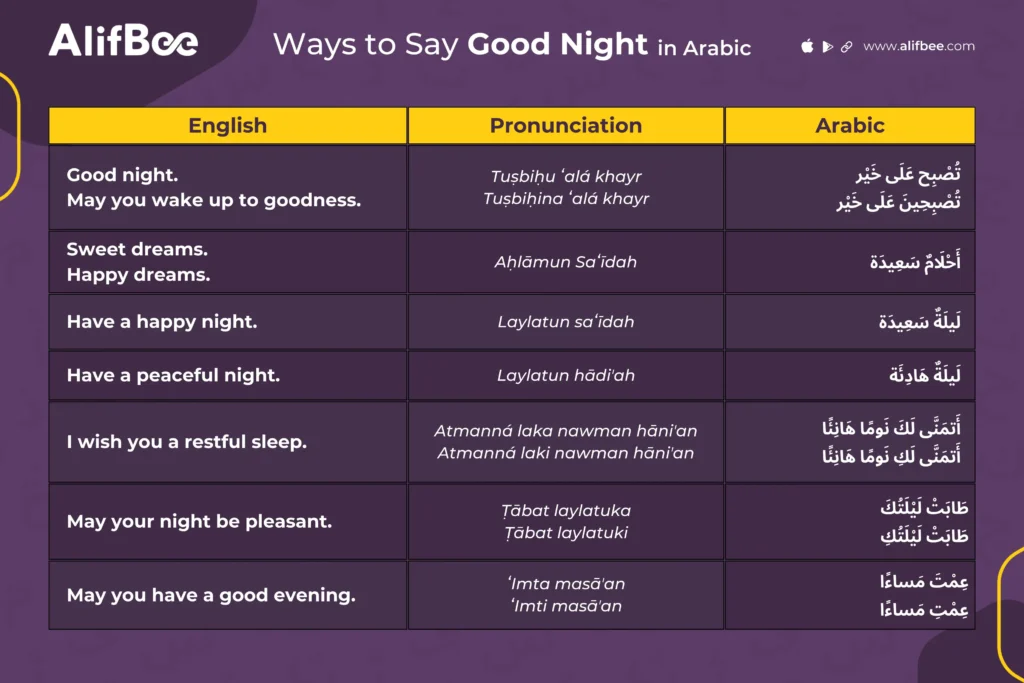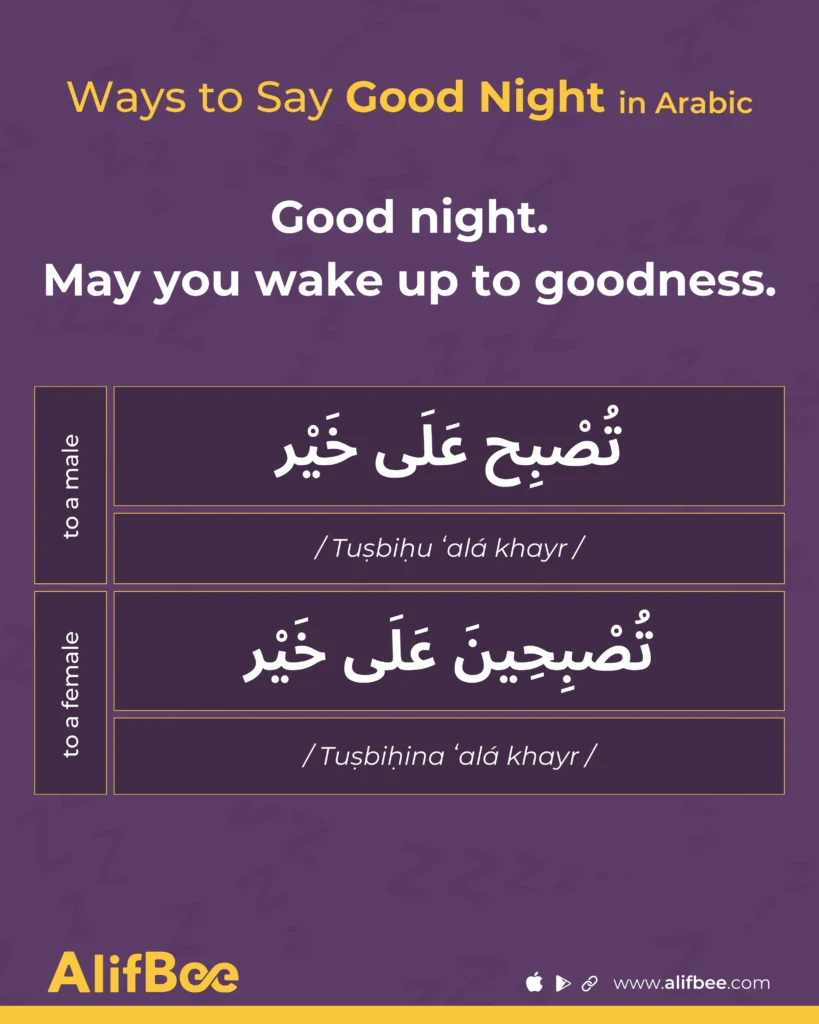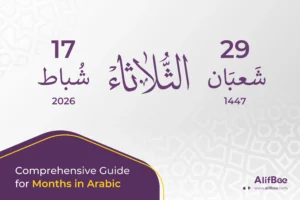Imagine trying to say goodnight in Arabic and saying good morning instead. It would make for a good joke, but if you’re new to the language and talking to someone who is not a friend, it might leave a negative impression! Proper (and correct) Arabic greetings leave a positive first impression, build trust, and help demonstrate your respect for the language.
Also, when you’ve learned and mastered words and basic Arabic phrases like hello, goodnight, and goodbye, you can easily initiate or manage daily conversations. That being said, good night is one of the most used greetings in Arabic. Native-speakers use the phrase almost daily, whether they’re at home and about to go to sleep, or outside and parting with friends for the evening.
In this guide, we’ve compiled a list of 7 different ways to say good night in Arabic, using the correct pronunciation, dialect, and context. Ready to learn? Let’s begin!
How Do You Say Good Night in Arabic
There are multiple ways to say have a good night in Arabic, including some formal options as well. Note that each sentence in Arabic has its own translation and tone, with some being warm and personal, and some being polite and respectful.
Modern Standard Arabic (MSA) and regional dialects are both common when it comes to saying goodnight in Arabic. Below, we have compiled a list of some of the most common Arabic expressions and phrases you can say to express your farewell greetings. To make it easier for you to learn, we have also included pronunciations, meaning, and cultural notes of each phrase, so you know exactly when and where to use them!
Quick tip: Focus on pronunciations and text — it’s one of the best strategies to learn a language fast, especially Arabic!
Your Arabic Takeaway

Tuṣbiḥu ʻalá khayr - تُصْبِح عَلَى خَيْر
English Meaning
Pronunciation
Arabic
Good night. May you wake up to goodness (M)
Tuṣbiḥu ʻalá khayr
تُصْبِح عَلَى خَيْر
(F)
Tuṣbiḥīna ʻalá khayr
تُصْبِحِينَ عَلَى خَيْر
Tuṣbiḥu ʻalá khayr is the most common way to say good night in MSA. Khayr in Arabic means good and welfare and Tuṣbiḥ means become. You can use the phrase Tuṣbiḥ ʻalá khayr when leaving someone at night or before going to bed.
However, when addressing a female, you should say Tuṣbiḥīna ʻalá khayr (تُصْبِحِينَ عَلَى خَيْر) instead. Also, note that if you travel to Egypt or the Levantine region, you may hear Tisbaḥ ʻalá khēr. It means the same thing, but is just shorter to say, and is commonly used in Levantine countries.
When you say Tuṣbiḥ ʻalá khayr to your Arabic-speaking friend, they may reply with Wa anta min ahlihi (وَأَنتَ مِن أَهْلِهِ), which means, “And may you be among its people.”
Aḥlāmun Saʻīdah - أَحْلَامٌ سَعِيدَة
English Meaning
Pronunciation
Arabic
Sweet dreams. Happy dreams
Aḥlāmun Saʻīdah
أَحْلَامٌ سَعِيدَة
Second on the list, Aḥlāmun Saʻīdah is a friendly way to wish someone pleasant dreams. It is often said to children and close friends. For context, Tuṣbiḥ ʻalá khayr gives you a more formal touch, whereas Aḥlāmun Saʻīdah adds a personal touch in your conversation.
This phrase is very well understood across all regions. However, in Levantine dialect, you may hear أَحْلَام حِلْوَة which is pronounced as Aḥlām ḥilwah. It is often said to children or close family/friends. Moreover, in Moroccan dialect, أَحْلَام زوينَة is more common which is pronounced as Aḥlām zwynah. It highlights Morocco’s use of “زوين” (beautiful) in everyday speech, adding a local cultural flavor.
Laylah Saʻīdah - لَيْلَة سَعِيدَة
English Meaning
Pronunciation
Arabic
Have a happy night. Blessed night (Gulf Arabic)
Laylatun saʻīdah
لَيلَةٌ سَعِيدَة
Laylah Saʻīdah is the Arabic equivalent of saying “Have a good evening” in English. You can use it in a casual as well as formal setting, with more emphasis being on the latter. The phrase Laylah Saʻīdah is more common in written Arabic or when making a formal speech or writing. It is more commonly used in books and news broadcasts where the tone is formal and respectful.
That being said, remember when pronouncing Saʻīdah, which translates to happy, you don’t say Sa-idah or Sa-i-daa. Instead, the correct way to say it is Sa-ee-dah. In response, you may hear Laylatuka saʻīdah (لَيْلَتُكَ سَعِيدَة) as a male and Laylatuki saʻīdah (لَيْلَتُكِ سَعِيدَة) as a female.
Laylatun Hādiʼah - لَيلَةٌ هَادِئَة
English Meaning
Pronunciation
Arabic
Have a peaceful night
Laylatun hādiʼah
لَيلَةٌ هَادِئَة
You’re more likely to hear someone say Laylatun Hādiʼah when you’re going to bed. It’s like telling the other person to have a peaceful night in English.
Similar to its English counterpart, Laylatun Hādiʼah is a formal phrase of wishing someone a good night or goodbye in Arabic. You can use it with acquaintances, colleagues, or in polite settings. Moreover, Laylatun Hādiʼah works well if you want to send someone a card or written message with farewell greetings.
This phrase uses the adjective هادئ hādiʼ meaning calm and quite, which reflects the wish for not only calm sleep but also mental peace. However, it is less common in casual daily settings but you can use it when you want to add elegance to your speech.
Atmanná Laka Nawman Hāniʼan - أَتمَنَّى لَكَ نَومًا هَانِئًا
English Meaning
Pronunciation
Arabic
I wish you a restful sleep (M)
Atmanná laka nawman hāniʼan
أَتمَنَّى لَكَ نَومًا هَانِئًا
(F)
Atmanná laki nawman hāniʼan
أَتمَنَّى لَكِ نَومًا هَانِئًا
Atmanná Laka Nawman Hāniʼan (أَتمَنَّى لَكَ نَومًا هَانِئًا) is a bit difficult to learn and pronounce compared to other phrases. However, it is one of the warmth and caring ways to wish someone a good night. The literal meaning of Atmanná Laka Nawman Hāniʼan is I wish you a restful sleep, which is commonly used in family or close relations, especially by parents or elders when they are talking to their children.
When speaking to a male, you have to use “laka nawman,” whereas when speaking to a female, use “laki nawman.” However, in Levantine dialect, you may hear or say Nūm alhanā (نُوم الهَنَا) to a male and Nūm alʻawāfī to a female.
If you’re finding it difficult to remember different variations of this phrase, try learning the meaning of the single words in isolation. Hānā (هنا) means bliss and comfort while awāfī (عوافي) means health,and if you’re talking to a group, you will use the word A’afiya (عافية).
Ṭābat Laylatuka - طَابَتْ لَيْلَتُكَ
English Meaning
Pronunciation
Arabic
May your night be pleasant (M)
Ṭābat laylatuka
طَابَتْ لَيْلَتُكَ
(F)
Ṭābat laylatuki
طَابَتْ لَيْلَتُكِ
Next on the list, Ṭābat Laylatuka (طَابَتْ لَيْلَتُكَ) is a more formal and literary way to wish someone a good night in Arabic. In fact, you may even read it in classical Arabic writing, novels, poetry, and newspapers. The literal meaning of Ṭābat Laylatuka is “May your night be pleasant.” For a female, you have to say Ṭābat laylatuki (طَابَتْ لَيْلَتُكِ).
This phrase reflects a traditional style that gives learners insight into Arabic heritage. Using it today can make your Arabic sound elegant and somewhat poetic.
If you’re in a polite setting or attending a ceremony, you can use Ṭābat Laylatuka to end your speech, sounding more refined and elegant. Moreover, while you can say it to your friends, note that it is uncommon to use in a casual environment and daily settings.
Imta Masāʼan - عِمْتَ مَساءً
English Meaning
Pronunciation
Arabic
May you have a good evening (M)
ʻImta masāʼan
عِمْتَ مَساءً
(F)
Imti masāʼan
عِمْتِ مَساءً
Similar to Ṭābat Laylatuka, Imta Masāʼan (عِمْتَ مَساءً) is also a classical and elegant way to wish someone a good night in Arabic, which in literal words mean “May you have a good evening.” When speaking to a female, you need to use “Imti masāʼan” instead of “Imta masāʼan.” It is rarely used today but it will give you an insight into older and poetic Arabic styles.
In old Arabic greetings, you will find two versions of this phrase, ʻimta ṣabāḥan عمت) (صباحًا and ʻimta masāʼan (عِمْتَ مَساءً); one for morning and another for farewell greetings. ʻimta ṣabāḥan (عمت صباحًا) means good morning and ʻimta masāʼan (عِمْتَ مَساءً) means good evening. The easier way to remember it is by learning the word “Imta (عمت)” which comes from Anʻama Allāhu ʻalayka “(أنعم الله عليك) which means “May God bless your morning/ evening.
7 Tips for Using Good Night Phrases in Arabic
Now that you know how to say good night in Arabic, let us walk you through some important tips that’ll help you learn even more quickly.
Here are 7 tips for using good night phrases in Arabic:
- Write the phrases in both Arabic script and Latin script, and then try saying it out loud while writing the phrases as well. This is a memorization technique suggested by the University of North Carolina as well, and it can help you connect the sound with the letters easily.
- Know who you are speaking to, and learn phrases accordingly. In Arabic, small differences in pronunciation and words can change the whole context. Pay attention to these changes, especially when it comes to pronouns.
- Memorize Tuṣbiḥu ʻalá khayr and Aḥlāmun Saʻīdah as your go-to goodnight phrases in Arabic. Keep the former for formal settings (elders, teachers, new people), and the latter for casual settings (family and close friends).
- Listen to native speakers. Notice how they say Tṣbaḥ ʻala khēr in Egypt. In the Levant, you will hear Tsbaḥ ʻalá khēr. Hearing both dialects will help you understand the slight difference in culture and speech.
- Practice with short dialogues. For example:
- Tuṣbiḥ ʻalá khayr.
- Wa anta min ahlihi.
- Choose the dialect that matches your goals. If you plan to visit Egypt, focus on Egyptian Arabic. If you study Levantine Arabic, practice those versions.
- Use these phrases in your daily life, especially if you are around Arabic speakers. Say good night phrases before bed, or when leaving a gathering at night. Throw in a smile or a wave in the mix to build natural habits. Soon, the phrases will feel easy and comfortable.
Final word
All in all, remember that when speaking Arabic, the emphasis is always more on saying the right phrase at the right time instead of knowing multiple words. Understanding when to use a particular goodnight phrase and how to reply to it is what makes your Arabic sound natural, and connect with native speakers fluently.
So start using these phrases tonight. Practice will help you master the language! Starting tonight, develop a habit of saying Tuṣbiḥ ʻalá khayr before bed, or Aḥlāmun Saʻīdah to a family member.
Remember to take things one step at a time, and to learn as you go. If you ever feel overwhelmed or feel that learning Arabic is not your cup of tea, you can always use the AlifBee app for guided lessons. We make learning Arabic a fun and exciting journey for everyone!
















